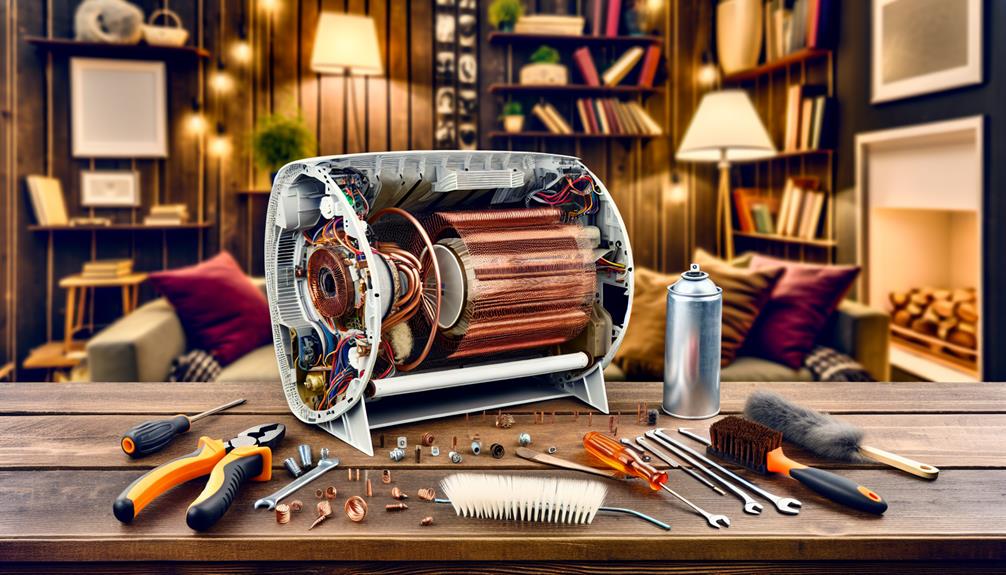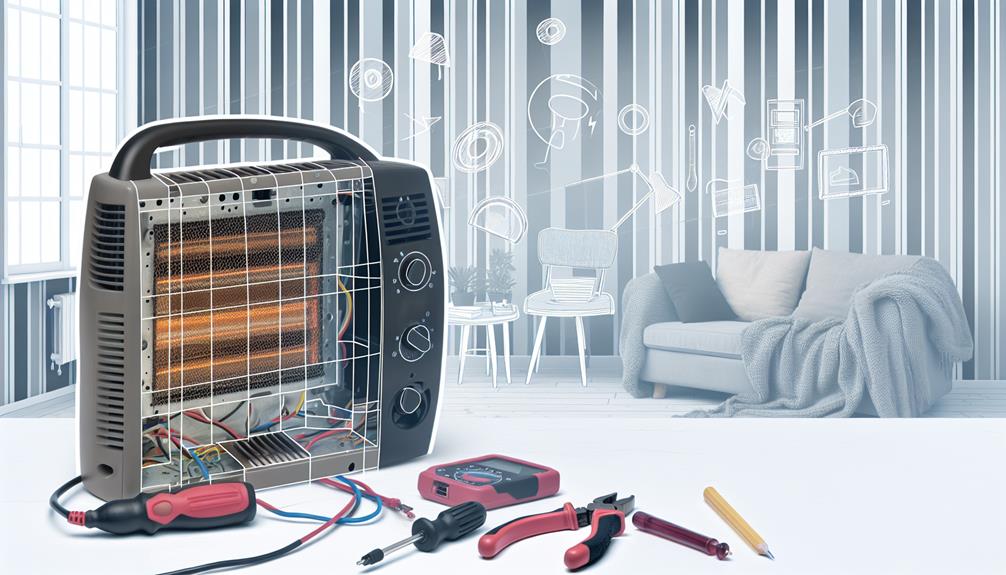When the chill of winter gently knocks on your door, your trusty portable heater steps up to embrace you with warmth. However, to ensure you're greeted with a cozy hug rather than a cold shoulder, you'll need to give your heater a little tender loving care. You're about to discover the essentials of portable heater maintenance, a journey that not only prolongs the life of your device but also safeguards your home. From understanding different types of space heaters to mastering the art of energy efficiency, you'll learn how to keep your warm companion in tiptop shape. But remember, like any good relationship, the key to longevity lies in the details—so let's explore how a few simple habits can prevent unexpected chilly surprises and keep that comforting warmth a constant in your abode.
Key Takeaways
- Understanding the different types of space heaters, such as fan-forced, infrared, ceramic, and water/oil-filled, can help in selecting the right one for your needs.
- Following essential safety precautions, such as placing the heater on a hard surface, maintaining clearance from combustible materials, and regularly checking the cord for damage, is crucial for safe operation.
- Routine cleaning and maintenance, including removing dust from vents, inspecting the cord for damage, and avoiding the use of extension cords, can help keep the heater in good working condition.
- Optimizing energy efficiency can be achieved by choosing models with advanced features, maintaining regular upkeep, using programmable timers, and selecting heaters with safety certifications and features like tip-over switches and overheating sensors.
Understanding Space Heater Types
When selecting a portable heater, it's crucial to understand the different types available, such as fan-forced, infrared, ceramic, and water or oil-filled models, ensuring you choose one with the Underwriters Laboratories label that suits your room's size. Fan-forced space heaters operate by blowing air over hot metal coils, rapidly warming the space with a direct flow of heat. This type is effective for quickly heating small to medium-sized areas.
Infrared portable heaters, on the other hand, generate heat using infrared light bulbs. They provide warmth akin to the sun's rays, heating objects and people directly in their path rather than the surrounding air. This makes them ideal for spot heating or in drafty spaces.
Ceramic heaters encompass a ceramic heating element and typically include fans to distribute the warmed air. They offer consistent heat and are often compact, making them a versatile choice for various settings.
Lastly, water or oil-filled models circulate heated liquid throughout the unit, slowly radiating heat into your room. These heaters are efficient for sustained, long-term use and maintain a more consistent temperature, which is perfect for extended periods of occupancy. Always match the heater's capacity with your room's size for optimal efficiency.
Essential Safety Precautions
Understanding the variety of portable heaters available is the first step; now let's ensure you're using them safely by discussing essential safety precautions. Space heater safety is paramount to prevent accidents and maintain a secure environment in your home. Here are critical measures you should always keep in mind:
- Proper Placement: Ensure your heater stands on a hard, level surface away from any combustible materials. This minimizes fire risks and allows the heater to operate efficiently.
- Clear Surroundings: Maintain a safe zone around the heater. This means at least 3 feet of clearance from anything that can burn, and making sure kids and pets stay clear of the unit.
- Attentive Usage: Never leave your heater unattended. Turn it off when exiting the room or before going to bed. Additionally, unplugging the heater when it's not in use is a wise habit to cultivate.
- Regular Maintenance: Check the heater's cord for any signs of wear or damage frequently, and only use heaters with intact safety features such as tip-over protection and overheat protection.
Moreover, installing and testing smoke alarms monthly ensures you're alerted promptly in case of an emergency. Always opt for heaters with safety certifications, as they have built-in mechanisms designed to avert common hazards.
Routine Cleaning and Maintenance

To ensure your portable heater's longevity and optimal performance, it's essential to perform routine cleaning and maintenance as outlined by the manufacturer's guidelines. Regular inspections are a critical component, allowing you to identify and address any signs of wear or damage promptly. Begin by ensuring the unit is turned off and unplugged. Then, using a soft brush or a vacuum with a brush attachment, carefully remove dust and debris from the heater's exterior vents and grilles. This prevents the accumulation of dust, which could potentially hinder airflow and efficiency.
Additionally, inspect the cord and plug for any signs of damage. Portable space heaters should always be plugged directly into an outlet to minimize the risk of fire. Avoid the use of extension cords, which can overheat and become a fire hazard. For safety features to function properly, such as overheat protection and automatic shut-off, the heater must be free from obstructions and placed on a hard, level surface.
Always maintain a safe distance—minimum three feet—from combustible materials. After cleaning, before you turn the heater back on, ensure it is completely dry and free from any cleaning residue. Consult the owner's manual for any specific maintenance instructions unique to your model. Remember, a well-maintained heater not only operates more efficiently but also ensures a safer operation.
Optimizing Energy Efficiency
To elevate your portable heater's energy efficiency, start by choosing models with advanced features like ECO mode, which automatically adjusts heat output to save power. You'll also need to maintain regular upkeep, as a well-maintained heater runs more efficiently and uses less energy. Implementing a programmable timer can further reduce consumption by ensuring the heater operates only when necessary.
Selecting Efficient Heaters
When selecting an energy-efficient space heater, prioritize models with safety certifications and features such as tip-over switches and overheating sensors to ensure both efficiency and safety. These certifications and features are your first line of defense in reducing fire risk, which in turn makes your heater's operation more efficient and cost-effective. Here's what to consider when buying a space heater to minimize energy bills:
- Look for a label indicating safety certification from a reputable independent testing organization.
- Choose heaters with automatic shutoff mechanisms to prevent overheating and potential fires.
- Ensure the heater includes a ground-fault circuit interrupter (GFCI) plug for additional electrical safety.
- Check the heater's fire safety and hot-surface scores as a benchmark for overall safety and efficiency.
Investing in these features will contribute to optimal heater efficiency and safer use.
Maintenance Boosts Efficiency
After securing a space heater with the necessary safety features and certifications, regular maintenance is crucial to maintain its energy efficiency and prolong its lifespan. Ensuring that your portable heater's filters are clean is fundamental; accumulated dust and debris can restrict airflow, causing the unit to work harder and consume more energy. Periodically inspect the heating element for any signs of wear or damage. A compromised element not just risks safety, but also reduces operational efficiency. Additionally, verify that the thermostat is functioning correctly to avoid unnecessary heating and energy wastage. Remember that maintenance boosts efficiency: a well-maintained space heater not only performs better but also minimizes energy costs. Adhering to a diligent maintenance routine guarantees optimal performance of your portable heaters.
Troubleshooting Common Issues

Have you encountered a problem with your portable heater not functioning as expected? Here's a step-by-step guide to diagnose and fix common issues. Troubleshooting common issues with space heaters requires a systematic approach to identify and resolve problems that prevent optimal operation.
- Power Source: Ensure your heater is plugged directly into a wall outlet. Using an extension cord can cause a voltage drop, potentially leading to malfunctions or hazards.
- Heat Output: If your heater isn't warming up the space adequately, check that it's set to the highest setting. Also, verify the area is well-insulated to prevent heat loss.
- Strange Smells or Smoke: In the event of an unusual odor or smoke, switch off your heater immediately. Unplug it, and look for blockages, such as dust or foreign objects, that might be causing the issue.
- Unusual Noises or Shutdowns: Rattling or grinding sounds can indicate loose internal components. Turn off the heater and inspect it. If your heater frequently shuts off, ensure the air intake isn't blocked and that there's enough clearance around the unit for airflow.
Proper Storage Solutions
Where should you store your portable heater to ensure its longevity and safety? The ideal location is dry and cool, away from any sources of direct sunlight and moisture that could cause corrosion. It's essential to protect your space heaters from these elements to maintain their efficiency and prevent premature wear.
Before storage, always unplug the heater and give it ample time to cool down—this is a crucial safety step to prevent any fire hazards. Storing your heater while it's hot or connected to extension cords can be dangerous and is strongly discouraged. After confirming that the heater is cool, place it in its original packaging or wrap it in a protective material. This will minimize dust accumulation and help keep the internal components clean and free from debris.
Choose a storage space with good ventilation to avoid the buildup of any fumes or odors that may emanate from the heater over time. This will also prevent any moisture accumulation, ensuring your space heater remains in top condition. By adhering to these storage guidelines, you're taking proactive steps to ensure both the safety and longevity of your portable heating unit.
Frequently Asked Questions
How Do You Maintain a Portable Heater?
Just like you wouldn't ignore your car's maintenance, don't neglect your portable heater's upkeep. Conduct safety checks, clear out dust, and perform regular inspections. Ensure it's on a stable, nonflammable surface away from kids and pets. Look for models with safety features like tip-over switches. Keep it clear of flammables, and follow the manufacturer's guidelines for care. Remember, proper maintenance not only extends its life but also keeps you safe.
Is It OK to Leave Portable Heater on All Night?
You shouldn't leave your portable heater on all night due to safety precautions and high energy consumption. Overnight risks include potential fires and carbon monoxide poisoning if it's a fuel-burning unit. Ensure you're using a model with automatic shut-off features. Always turn it off and unplug it when not in use, and regularly inspect for any damage to reduce hazards. Stay informed about these critical safety measures.
When You Use a Portable Heater You Should Keep It?
When you use a portable heater, it's like guarding a small sun in your home. For safety precautions, keep it on a solid, fire-resistant surface. Strict heater placement rules demand it be at least 3 feet from anything that can burn. Always follow usage tips: don't turn your space into a sauna by leaving it on unattended or while sleeping. It's critical to prioritize safety and efficiency with every use.
Can You Leave a Space Heater Plugged in but Off?
Yes, you can leave a space heater plugged in but off, yet it's not advisable due to fire hazards, increased energy consumption, and outlet stress. Always unplug your heater when not in use. This prevents accidental activation, minimizes risks, and conserves energy. Regularly inspect the cord for damage to ensure safety. Remember, sharing an outlet with other devices increases the risk of overloading and potential electrical issues. Stay informed and use heaters responsibly.
